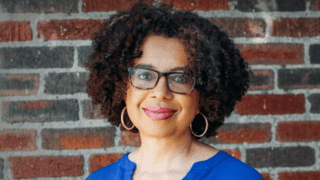Race, Crime, and the Making of Modern Urban America
The Lavin Agency Speakers Bureau
A speakers bureau that represents the best original thinkers,
writers, and doers for speaking engagements.
A speakers bureau that represents the best original thinkers,
writers, and doers for speaking engagements.
Bringing people of color into our companies isn't enough. We must transform our cultures so they can achieve their full potential.
Widely known as one of the most influential authorities on racial justice in America, Khalil Gibran Muhammad is redefining our understanding of inclusion. He’s the award-winning author of The Condemnation of Blackness, a “brilliant work that tells us how directly the past has formed us” (The New York Review of Books), and his work has been featured in the landmark New York Times “1619 Project” as well as Ava DuVernay’s Oscar-nominated Netflix documentary 13th. An incredibly dynamic, humorous, and grounding speaker, this Princeton professor explains how companies invested in true inclusion can break down the three barriers holding them back—efficiency, color-blindness, and investment—and free themselves for success.
“[The Condemnation of Blackness] is the most significant work in the study of race and American society to have appeared in the past decade.”—Glenn C. Loury, author of The Anatomy of Racial Inequality
Khalil Gibran Muhammad is the author of The Condemnation of Blackness: Race, Crime, and the Making of Modern Urban America. This vital book has been called “a mandatory read” (David Levering Lewis, Pulitzer Prize-winning author) and “a poignant reminder of how these inequalities were shaped and how deeply they reach back into the nation’s history” (Journal of African American Literature).
He is also the co-host, alongside his long-time friend Ben Austen, of the podcast Some of My Best Friends Are. Today a Princeton professor (Khalil) and an award-winning journalist (Ben), the two interracial best friends show us how we can have conversations about race and racism with levity—that we can stumble and still move forward. Some of My Best Friends Are is a thoughtful and compassionate exploration of the issues that divide us, showing us that we can come together, however imperfectly, in the process of learning.
After graduating from college, Khalil worked as a public accountant at Deloitte & Touche LLP for three years, giving him a lens into how businesses work, why inclusion and belonging are crucial to company success, and how to actually implement it. As organizations across the country that inclusion is the key to greater competitiveness, why are people of color still vastly under-represented in senior leadership? “It takes courage to redistribute power and it takes candidness to reflect on the fact that we do have a problem in our society,” Khalil says. With both a corporate and academic background, Khalil’s talks break down the three barriers that must be overcome for organizations to transform and harness the best ideas for success in the 21st century.
Khalil is the inaugural Professor of African American Studies and Public Affairs at Princeton University, and was previously Professor of History, Race, and Public Policy at Harvard Kennedy School. He is the former Director of the Schomburg Center for Research in Black Culture, a division of the New York Public Library and the world’s leading library and archive of global Black history. His writing and scholarship have been featured in a number of national print and broadcast media outlets, including The New York Times—notably as one of the contributors to its landmark “The 1619 Project,” which explores and exposes the true history of slavery in America—The New Yorker, The Washington Post, NPR, and MSNBC. He holds two honorary doctorates, and is on the board of The Museum of Modern Art, The Vera Institute of Justice, and The Nation magazine.
Dr. Muhammad was absolutely amazing. He left our community pondering all the information and reflections that were shared. Moreover, we anticipate that his information will be a catalyst for future dialogue in the community. He is probably one of the best, if not the best speaker we have had in my 18 years of doing this event. His intellect is as sharp as any I have encountered. What an evening!
Evansville-Vanderburgh County Human Relations Commission
Harvard Economist MacArthur Genius Studying Economic Opportunity Director of Opportunity Insights

Author of Indivisible: How to Forge Our Differences into a Stronger Future Founder and CEO of WatchHerWork

Author of The 272: The Families who Were Enslaved and Sold to Build the American Catholic Church Tenured Professor at New York University Former New York Times Johannesburg Bureau Chief

Harvard Kennedy School Professor Author, How to Disagree Better

Harvard Economist MacArthur Genius Studying Economic Opportunity Director of Opportunity Insights

Speaker on Stress and Leadership in the Workplace Columbia Business School Professor Host, TED Business Podcast Expert, Limitless with Chris Hemsworth

Founder of the "I Matter" Poetry and Art Competition Teen Vogue 21 Under 21 Honoree Winner of the Princeton Prize in Race Relations

Former Mayor of Baltimore Founder, SRB & Associates

World-Renowned Artist Winner of the US Department of State Medal of Arts Guggenheim Fellow

Author of Grit, the #1 New York Times Bestseller | Pioneering Researcher on Grit, Perseverance, and the Science of Success

2024 Nobel Prize Winner | 3rd Most Cited Economist in the World | Bestselling Co-Author of Why Nations Fail and Power and Progress

Harvard Business School Behavioral Science Professor | "40 Under 40 MBA Professor" | Author of TALK: The Science of Conversation and the Art of Being Ourselves

#1 New York Times Bestselling Co-Author of Abundance | Host of thePlain English Podcast | Founder of the Substack Derek Thompson

#1 New York Times Bestselling Author of How the Word Is Passed and Above Ground | The Atlantic Staff Writer

Just as there is a wealth and income gap, a health and achievement gap, and a punishment and opportunity gap, there is also a power gap in our civic and corporate institutions. In a nation where nearly every organization values inclusion and almost every individual believes in “opportunity for all,” people of color are vastly under-represented in senior leadership positions across all sectors of American society. Something is still not working.
So what explains this enduring maldistribution of power and influence among men—and especially women—of color? And what should we do about it? Is it even enough to focus on racial representation as the measure of progress? In this invaluable talk for leaders in companies both large and small, Khalil Gibran Muhammad outlines three barriers—efficiency, color-blindness, and investment—that must be overcome for organizations to transform and harness the best ideas for success in the 21st century.


Juneteenth commemorates the last African Americans to gain their freedom from slavery. Like so much of American history, it was a moment of great promise and impending peril. Black freedom was not embraced by those who long benefited from slavery, even in the aftermath of a destructive war and a devastated nation. Slavery, the original sin of America, was not an aberration in the DNA of the nation, but rather one of its pillar institutions. And as it evolved from slavery to segregation, the story of racial progress was also a story of racial retreat and backlash.
In this compelling talk, racial justice authority Khalil Gibran Muhammad reveals how the reluctant freedom extended to Black Texans can act as a reminder: that we all have a role to play to challenge oppression in our society today, and to be vigilant stewards of the freedoms we have. Juneteenth gives us a chance to look at the twin legacies of slavery and freedom, side by side, and helps us to reflect on how far we’ve come and how far we still must go.